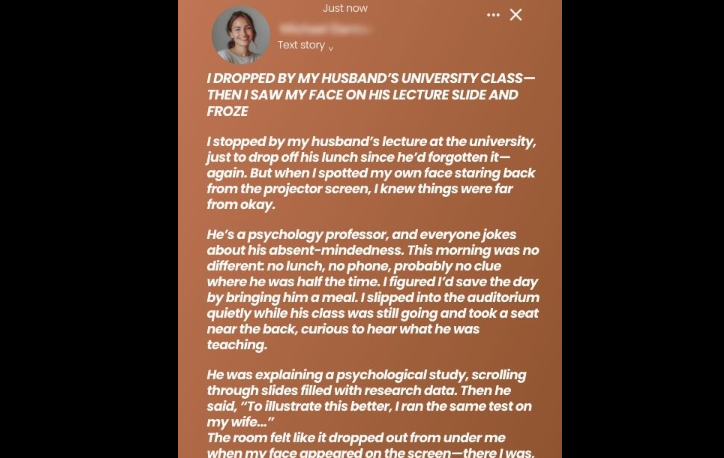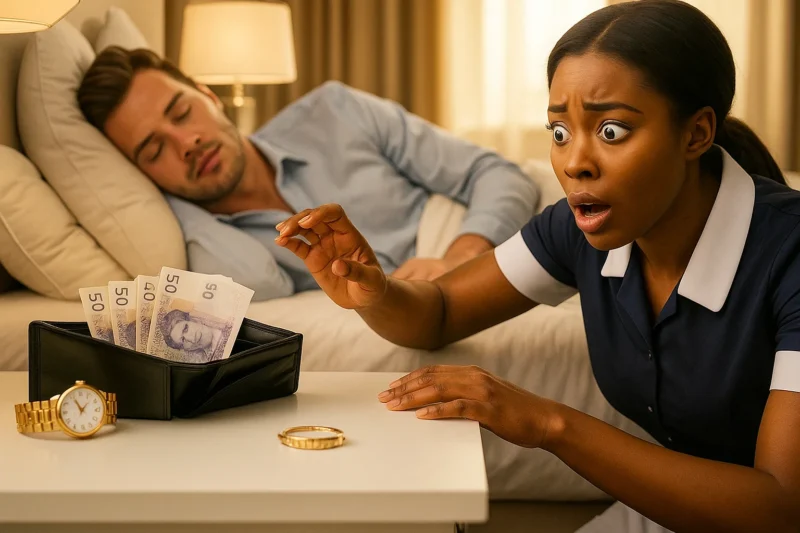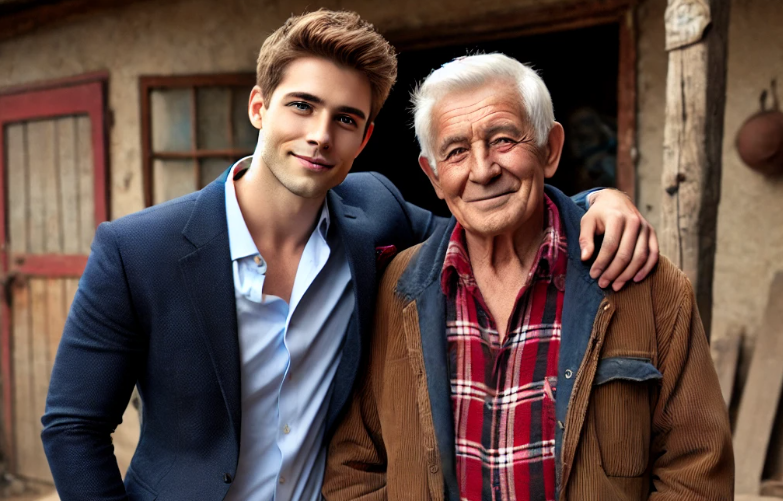I paused my routine and visited the university lecture hall, solely to deliver my husband’s forgotten lunch, a classic instance of his trademark absent-mindedness. Yet, the moment I saw my own face projected onto the massive screen, a sudden and profound sense of alarm overtook me.
Dean, my husband, is a psychology professor—he’s thirty-eight—and his habitual lack of focus is a running gag among his colleagues and students. That morning was entirely consistent with his reputation: no packed lunch, no cell phone, and likely a shaky grasp on his immediate whereabouts. My initial thought was simply to rescue the situation by providing him with a meal.
I slipped into the auditorium without a sound while his class was in session and found a quiet seat near the rear, intrigued to observe his teaching style. He was in the process of detailing a psychological study, navigating through a series of slides dense with research data.
Then he announced, “To effectively demonstrate this principle, I performed the identical assessment on my wife…”
The ground seemed to give way beneath me as my image materialized on the display—there I was, positioned directly beside a concise list detailing personality traits and measured test results.
Dean was explaining tendencies in personality patterns and various decision-making frameworks, and it appeared he had decided it would be an excellent teaching moment to use me as a real-time case study. The photograph was lifted straight from our last vacation album—I was seated in a Florida beach chair, wearing sunglasses, holding a cocktail, and beaming broadly.
The student body diligently scribbled notes. A few students shared a quiet laugh when Dean made a quick remark about my continuous need to verify locked doors and my habit of agonizing over various “what if” scenarios.
A scorching wave of embarrassment swept over my face. Was he truly exposing my private idiosyncrasies and personal details to a lecture hall populated by twenty-year-olds?
Dean advanced to the next visual. More bullet points followed. “Observe here,” he carried on, “how she consistently attains high scores in conscientiousness yet demonstrates notable difficulty with impulsivity. She will construct flawless plans but sometimes experiences paralysis during the actual decision point, a relationship that is quite intriguing when we consider…”
That was the absolute limit. My hand shot into the air before any deliberate thought could intervene. Half the students rotated in their seats to observe me, murmuring amongst themselves. Dean narrowed his eyes, and when he recognized me, his jaw went completely slack.
“Sweetheart,” he managed to stammer out. “What are you—um—doing here?”
“I could pose that exact question to you,” I retorted, ensuring my voice remained level despite the fierce pounding in my chest.
A wave of muffled laughter flowed across the lecture hall. The students clearly interpreted the exchange as part of the scheduled routine.
“It’s quite alright,” Dean quickly declared, adjusting his tie with a nervous tug. “We will resume this discussion momentarily. Class is now dismissed.”
The room immediately filled with noise as students gathered their belongings, still snickering and exchanging whispers. I remained motionless in my seat until the majority of them had departed. I then proceeded to march directly to the front row.
“Dean,” I hissed, forcefully pressing the paper lunch bag against his chest. “What in the world was the meaning of that?”
He had the grace to appear thoroughly chagrined. “I—uh—I genuinely did not think you would object. I required an illustrative example that would resonate with the students’ experiences. Everyone references their spouses in classroom anecdotes.”
“Not in this manner,” I snapped back. “You displayed my actual test results. My image. A comprehensive analysis of my personality.”
He nervously rubbed the back of his neck. “It contained absolutely nothing humiliating.”
“Are you certain of that?” I said, my voice rising. “Do you possess any understanding of how mortifying that experience was? They were laughing. Directly at me.”
“They were amused by the typical human quirks. Not at you as an individual.”
I stared at him with profound disbelief. “That distinction is nonexistent, Dean.”
For once, he offered no rebuttal. He simply stood there, clutching the paper bag like a thoroughly chastised schoolboy.
We exited the building together in an uncomfortable silence, the crisp autumn air feeling sharp against my skin outside the brick structure. I felt no desire to share a ride home with him. I swiftly ordered a taxi and left him standing alone on the university steps.
The Aftermath and the Hidden Study
That evening, upon his return home, he attempted a reconciliation with a bouquet of flowers. He placed them in a vase on the kitchen counter and apologized, saying, “I am truly sorry. I was not thinking clearly. My sole intention was to provide my students with a lesson they would truly retain.”
“And now I have become the punchline they will retain for the entire semester,” I stated matter-of-factly.
He sighed heavily. “You are correct. It was deeply thoughtless. I will permanently remove those slides.”
However, a fundamental uneasiness persisted within me. It was not merely the fact that he had used me in his lecture. It was the sudden realization that he had apparently conducted a full psychological assessment on me without my prior knowledge.
“Dean,” I questioned slowly, “when precisely did I participate in this assessment you exhibited?”
His eyes briefly darted away. He looked down at the floor. “Well… technically speaking, you were unaware you were taking it.”
“What?”
He swallowed visibly. “Do you recall last month when I posed those numerous survey questions, ostensibly for amusement? Questions concerning how you would respond in various hypothetical situations? That constituted the assessment.”
My stomach churned. “You deliberately misled me into participating in a study?”
“Not a study. It was simply… an informal sample. Strictly for teaching purposes.”
“You nevertheless deceived me.”
He rubbed his temples in frustration. “I did not engage in falsehoods. I merely neglected to inform you of the complete objective.”
“That perfectly describes the act of lying, Dean!”
We continued to argue until close to midnight. He offered continuous apologies, and I could discern his genuine regret, but I could not dispel the deep-seated sensation of being exploited. It felt as though I was merely another subject in his research, not his actual wife.
The following morning, the feeling had not subsided. I arrived at work feeling disoriented, mentally replaying the humiliating moment repeatedly. My close friend and coworker, Lorna, noticed my mood instantly.
“You look like you’ve been sucking on a lemon,” she remarked, dropping into the chair opposite my desk.
I recounted the entire saga. By the conclusion of the story, her eyes were wide with shock. “He displayed your face on a presentation slide? Girl, that is truly outrageous.”
“You are telling me.”
“If my husband pulled that stunt, I would march directly into his dean’s office and cause absolute chaos.”
I shook my head firmly. “I do not wish to irreparably damage his career. I simply desire his respect.”
A Shift in Perspective and a Surprising Twist
But later that week, a remarkable occurrence took place. One of Dean’s students—a young woman named Hannah—approached me while I was in the grocery store.
“Excuse me,” she began, speaking with a noticeable shyness. “You are Professor Whitmore’s wife, correct?”
I hesitated before confirming, “Yes…”
“I only wanted to tell you… I actually found what he presented about you in class to be genuinely touching. It was apparent that he deeply admires you. He managed to convey that your so-called quirks are the very qualities that make you so thoughtful. Honestly, it made a strong impression on me. It prompted me to reconsider how my boyfriend sometimes pokes fun at my habits, realizing that perhaps those are simply core components of who I am.”
I was momentarily left speechless. I managed a mumbled, polite thank you, but internally, I felt thoroughly shaken.
Had my initial interpretation of the entire incident been completely inaccurate?
That evening, I directly questioned Dean: “When you decided to include me on that presentation slide, what fundamental point were you attempting to convey?”
He gazed at me with profound seriousness. “That actual human beings are not mere data points. That behind every graph and every statistic is someone we cherish, someone inherently complex. I wanted my students to grasp that psychology extends beyond simple figures—it is intrinsically about people.”
His sincerity was so evident that it caused a dull ache in my chest.
Despite the emotional resonance, I firmly stipulated that he required my explicit consent before ever undertaking any such action again. He readily agreed to my condition.
I truly believed the issue was resolved. But two weeks later, an unexpected development occurred that I had not foreseen.
Dean was formally nominated for a teaching award by his own students. The accompanying nomination letter—bearing the signatures of dozens of them—specifically highlighted the lecture where he had used me as a living example. They wrote that the lesson had humanized the course material, fostered a sense of connection, and served as a powerful reminder to view their future patients as whole individuals, not merely clinical cases.
When the awards committee extended an invitation for me to attend the ceremony, I felt deeply conflicted. A part of me still wished to hide from the memory. But another part recognized that perhaps, undeniably, my spontaneous “guest appearance” had initiated a positive shift.
At the ceremony, Dean delivered a speech. He looked directly at me and stated, “I have learned a vital lesson. Even when your intentions are positive, you must never use another person’s story without their permission. I made that mistake. But I also discovered that true love means choosing forgiveness and deciding to advance together.”
The room erupted in applause. I felt my eyes begin to sting with tears.
Following the presentation, one of his university colleagues leaned in close to me and quietly said, “He constantly talks about you in the faculty break room. You are his absolute favorite subject.”
For the first time, that statement did not sound at all unpleasant.
Dean and I engaged in a long and meaningful conversation that night. He promised complete transparency moving forward, no more concealed experiments without my consent, and absolutely no further surprises on his lecture slides. In return, I admitted that perhaps my perceived quirks were not personal flaws to be hidden away but integral parts of me he had always admired.
Ultimately, the entire ordeal unexpectedly brought us significantly closer. He internalized the vital concept of respect. I learned the importance of not immediately leaping to the most negative conclusion. And his students? They absorbed the most crucial lesson of all: human beings are never merely bullet points on a presentation slide.
Life possesses a curious ability to transform moments of intense embarrassment into genuine personal growth. Sometimes, the very things we fear will bring us shame become the exact elements that assist others in achieving a clearer understanding of the truth.
If this personal account has resonated with you, consider sharing it with someone. And remember to show your support by liking it—it might be a valuable reminder to another person that our individual quirks are frequently our most defining and greatest strengths.




